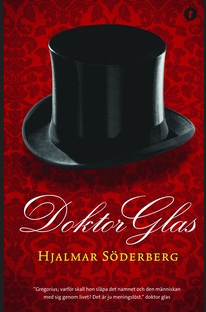One of the few books I have left of my personal library at my parents’ house in the US is a Swedish paperback copy of Doktor Glas. It’s an early testament to my Swedish studies, with penciled notes covering the first page (after which point I gave up taking notes). I flipped through it while I was home, without anything else in Swedish except Min är hämnden—which was of course dependent on how quickly I could get through the French first. As my eyes fell over the opening paragraph, I remembered the email newsletter that I’d heard so much about: Dracula Daily. In case you missed it, web designer Matt Kirkland got the idea to set up a Substack that sends subscribers bite-sized (har har) chunks of Dracula to people via email. Dracula is an epistolary novel, so the episodic format of an email newsletter pretty neatly aligns with the original structure of the novel. On the dates of the letters (or newspaper articles, etc.), the newsletter sends out the corresponding chapter by email. It’s become quite popular. There are memes.
Then I noticed that the date of the first entry in Doktor Glas, June 12, wasn’t too far behind the actual calendar date.
Wouldn’t it be fun to do a version of Dracula Daily with this?
Thus I read Doktor Glas for the third or fourth time, this time in brief extracts, letting the story unfold for me in real time at the same pace as it unfolds for Tyko Glas.
I’d previously done a short walking tour of Stockholm based on the book as well. It was a fantastic idea, but presented through a bloated app that was a bit too gimmicky for the source material and that just about drained all the battery life out of my phone in little over an hour. Maybe one year I’ll combine the two and attempt to be in the right places on the right dates to get my reading done.
I mention all of this because October 7 is the date of the final chapter in Doktor Glas. This year’s reading is now over, and I can say that reading a book in this kind of controlled release format had a surprising effect on the entire experience.
Normally when you read a novel you’re compressing days, months, years of time into a few hours of a reading experience, or quite possibly extending a day or even just one or two hours of events into a reading experience that’s much longer than twenty-four hours. (I defy anyone, for example, to get through all of Ulysses in a single day.) But when you move through the story at the same speed as the character does, it becomes embodied in a very specific way. You have to move through the same stretches of time as them, waiting just as long as they do for something to happen. With the specific combination of Doktor Glas and living in Stockholm, the setting around you cycles through the same seasons that Glas describes. (Climate change reading of Doktor Glas: how do his descriptions of weather in Stockholm from June to September compare to what the equivalent period is like here now?)
On a spookier note, at times the practice took on a spiritual dimension, not dissimilar to what Zoltan describes in “Reading Jane Eyre as a Sacred Text.” There were even moments when it felt like outright bibliomancy. On a day when I felt absolutely terrible, for example, because I felt like I had made a fool out of myself in matters of friendship, Glas addresses the jilted Fru Gregorious: “Du måste komma över det. Du skall se att livet ännu har mycket för dig. Du skall vara stark.” Coincidence or not, there was something comforting about stumbling across those exact words in that precise moment.
The Dracula Daily format is also a fun exercise in patience and delayed gratification in a world where the default habit is to consume an entire book, show, series, whatever as quickly as possible. On the one hand it can make a big important classic less intimidating, but for something as relatively short as Doktor Glas it has the opposite effect, slowing you down and preventing you from reading the whole thing in just a few days. You pay closer attention. If all I have to read today is this paragraph, then I might as well look up this or that word that I can kind of guess at but don’t know for certain. I might as well read the whole section two or three times. Several weeks go by without any entries, building anticipation; other times the next chapter is no longer the inevitable forward momentum of a story but a pleasant surprise that you had nearly forgotten about.
This was a rewarding exercise and I’m grateful to Matt Kirkland for inadvertently giving me the idea. I look forward to applying it to other books.

